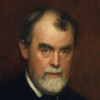“ When we really mean business and are hungry with affection, we do not know that we are in love, but simply go into the love-shop—for so any eating-house should be more fitly called—ask the price, pay our money down, and love till we can either love or pay no longer. ”
Samuel Butler, The Note-Books of Samuel Butler (1912). copy citation
| Author | Samuel Butler |
|---|---|
| Source | The Note-Books of Samuel Butler |
| Topic | money love |
| Date | 1912 |
| Language | English |
| Reference | |
| Note | |
| Weblink | http://www.gutenberg.org/files/6173/6173-h/6173-h.htm |
Context
“The proof of love, then, like that of any other pleasant pudding, is in the eating, and tested by this proof we see that consciousness of love, like all other consciousness vanishes on becoming intense. While we are yet fully aware of it, we do not love as well as we think we do. When we really mean business and are hungry with affection, we do not know that we are in love, but simply go into the love-shop—for so any eating-house should be more fitly called—ask the price, pay our money down, and love till we can either love or pay no longer.
And so with hate. When we really hate a thing it makes us sick, and we use this expression to symbolise the utmost hatred of which our nature is capable; but when we know we hate, our hatred is in reality mild and inoffensive.”
source



